How to Create a Google Ads Smart Campaign and Boost your E-commerce Revenue
Posted on 11/16/2023
Reviewed by Arnt Eriksen updated at 11/29/2023
Introduction
A Google Ads Smart Campaign uses machine learning to fine-tune your ads in order to convert your budget into sales. It's a tool which goes beyond mere clicks.
This is a straightforward guide to how to maximize revenue through Google Ads Smart Campaigns. We'll cover their functionalities, walk you through the setup and show you how to get the most out of your investment.
What is A Google Ads Smart Campaign?
Google Ads Smart Campaigns are a specialized campaign type which simplifies advertising across various Google platforms, such as Google Search, Google Maps, YouTube and Gmail. These campaigns will help you achieve your advertising goals, whether they are getting people to call you, visit your store, buy from your website or watch your videos.
Google Smart Campaigns are designed to simplify advertising, allowing you to focus on other aspects of your business while still getting great results from your ads.
Key Features of Google Ads Smart Campaigns:
- Ease of Set Up: Your ad can be created by taking a few simple steps, which are easy to learn and do not require specialist knowledge.
- Pay Only for Results: In Smart Campaigns you only pay when people interact with your ad, such as by clicking on it or watching your video.
- Reach People Everywhere: Smart Campaigns help you reach customers using computers, smartphones, and tablets.
- Performance Tracking: Google provides a dashboard which makes it easy to track your ads' performance and see important information like clicks, views, and conversions.
- Saves You Time: Your Smart Campaign does not need to be changed or optimized manually, as Google Smart technology automatically adjusts it over time in response to performance data.
Differences from Traditional Google Ads
Google Smart Campaigns are quite different from standard Google Ads:
- Control: In traditional Google Ads you set the keywords, bids and targeting yourself. Smart Campaigns do these things for you.
- Time and Effort: Standard Google Ads require constant monitoring. Smart Campaigns use machine learning to automatically optimize your ads, saving you time and effort.
- Setup: Smart Campaigns can be set up in just 15 minutes. Traditional Google Ads can take hours or days to set up.
- Optimization: Smart Campaigns continuously adjust keywords, bids and targeting to get you the best results. Traditional Google Ads rely on manual optimizations.
- Reporting: Smart Campaigns provide easy-to-understand reports showing your ads' performance. Traditional Google Ads require you to interpret more complex data.
Setting Up Your Google Ads Smart Campaign
Begin by logging in to your Google Ads account and clicking on "New Campaign" or "+".

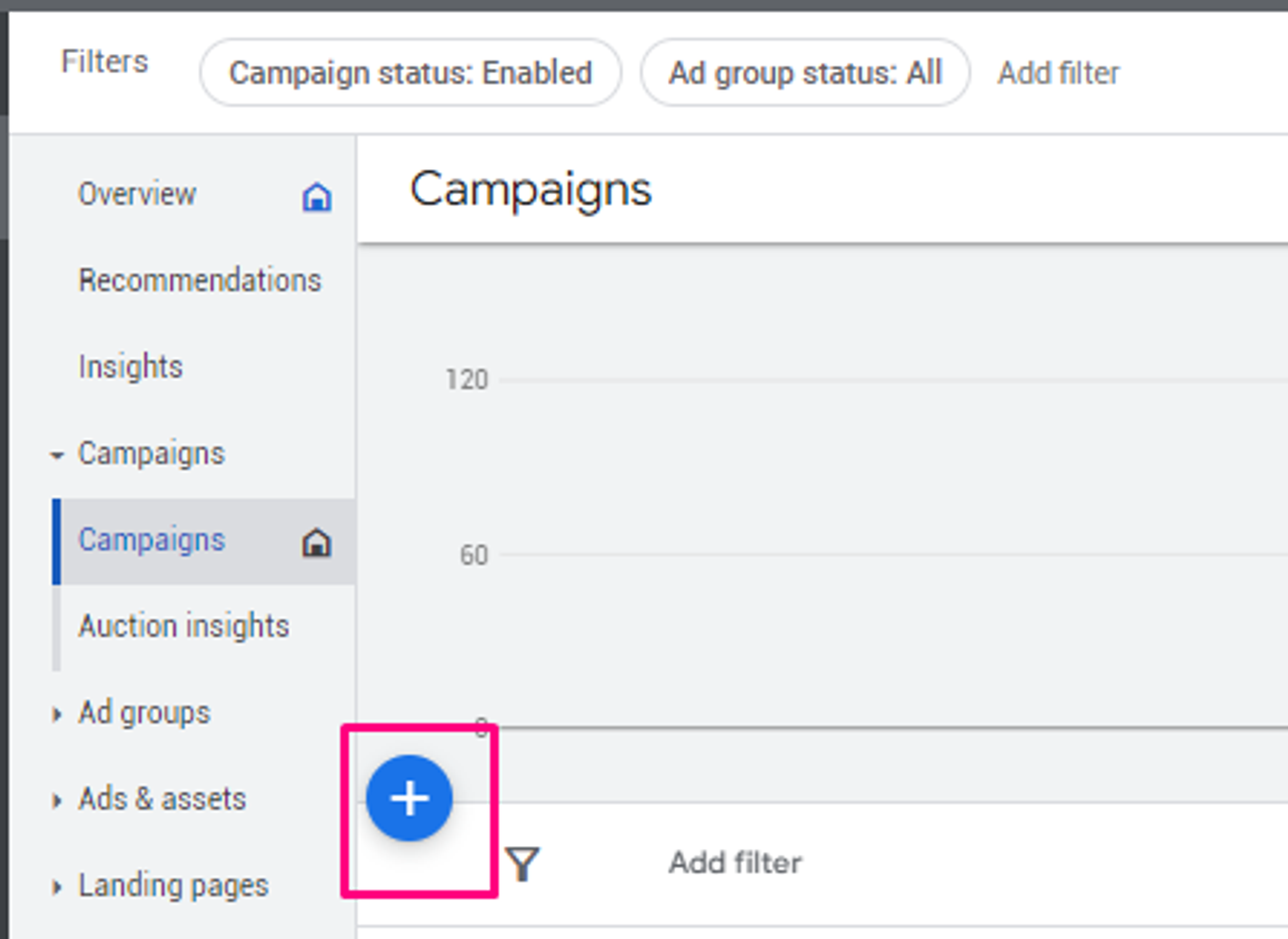
Step 1: Choose Your Objective
Select the objective which best fits your advertising goals, such as sales, leads or website traffic.
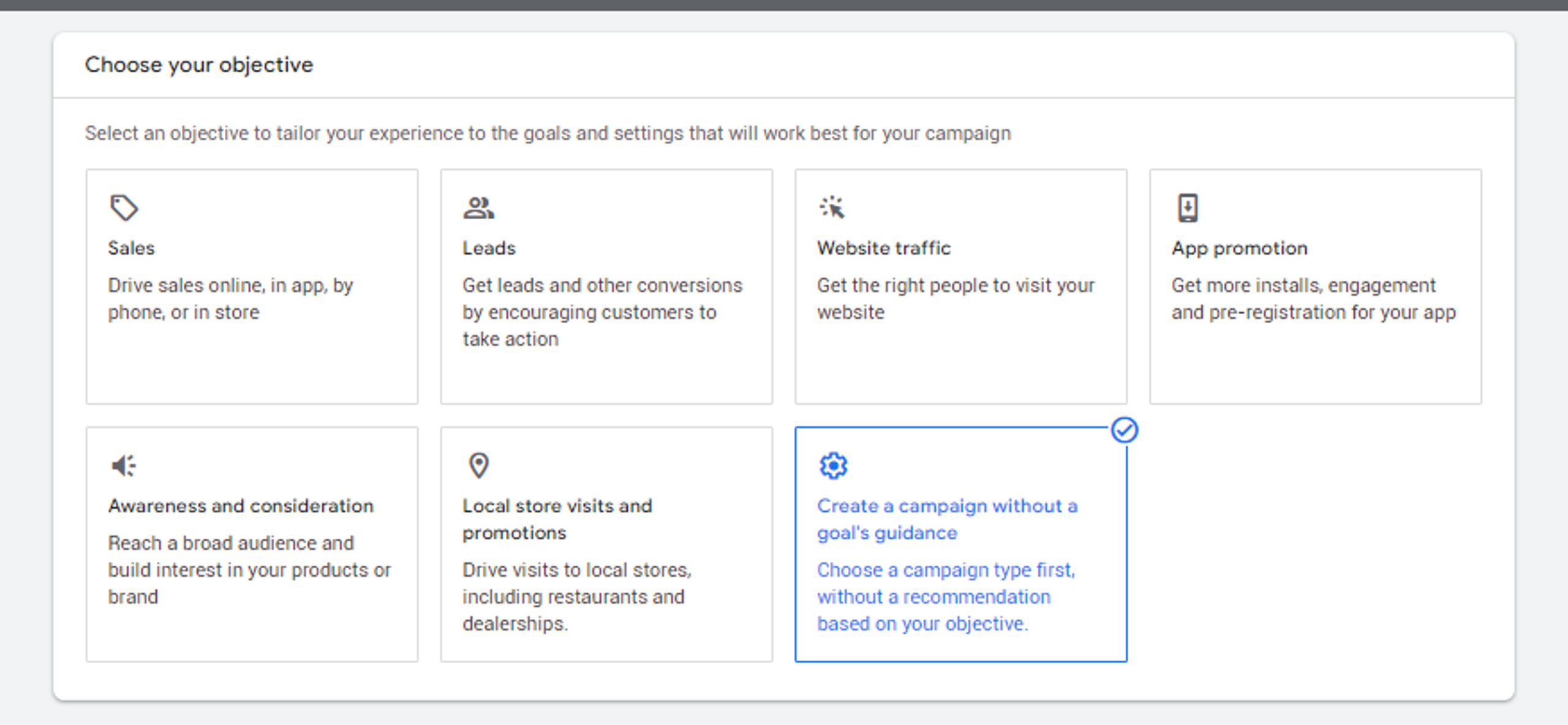
Step 2: Choose whether you would like to use info from your business profile
Decide whether you want to use the information from your Google Business Profile or create a new campaign from scratch.

Step 3: Choose your landing page
Select the landing page you want to direct your customers to when they click on your ad.
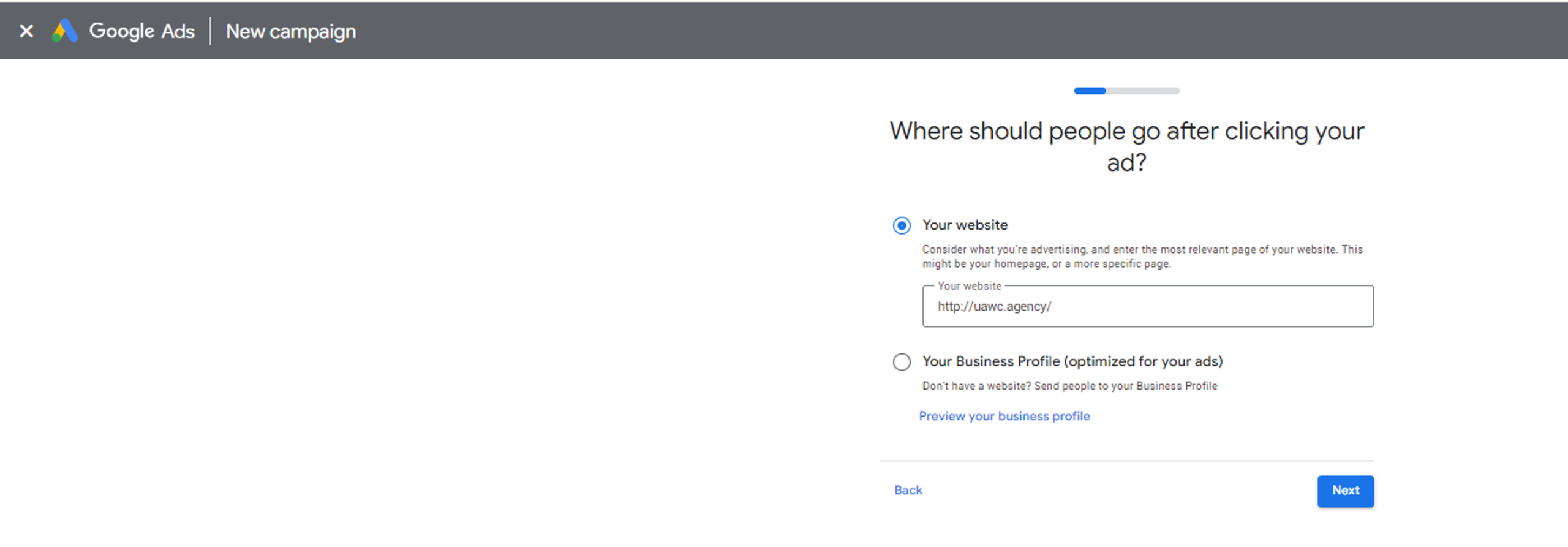
Step 4: Choose goals
Opt for "Smart" and decide what action you want customers to take, such as calling your business, visiting your store or taking actions on your website.
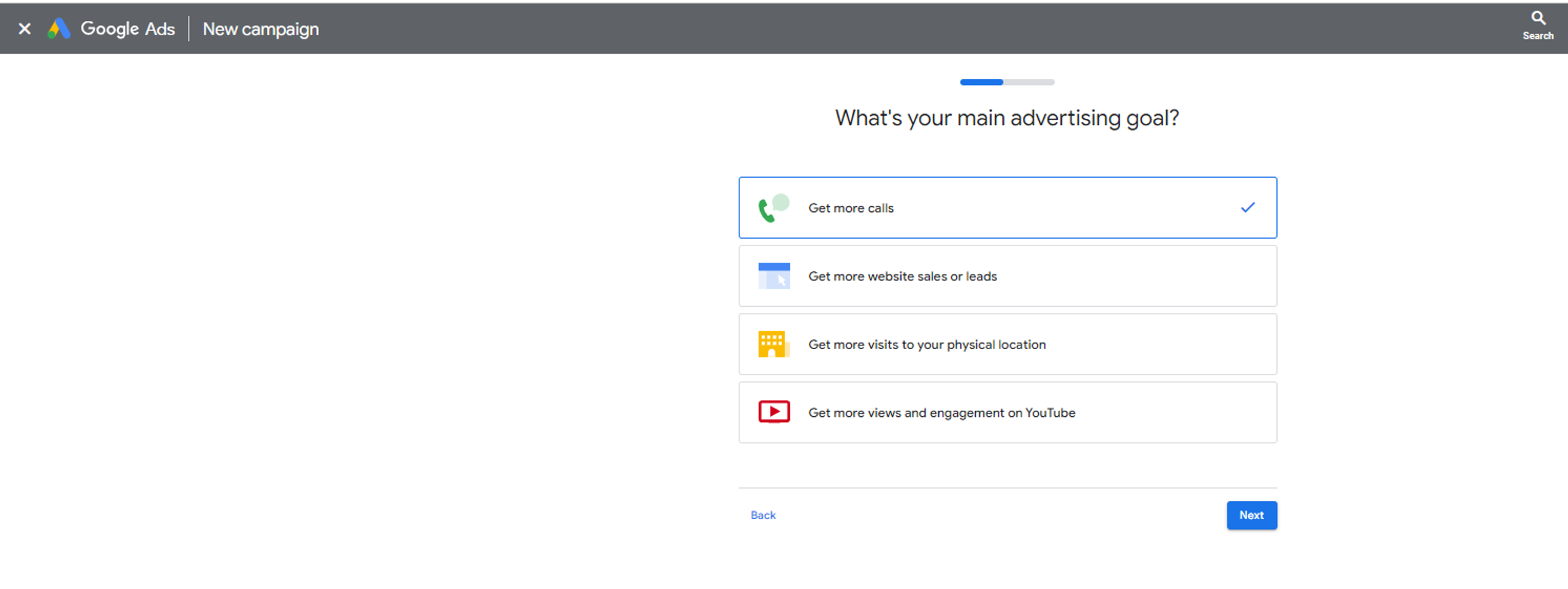
The proceeding steps will be tailored to each goal specification depending on the goal you choose.
Step 5: Craft Your Ads
Write your ad copy, including headlines and descriptions. You can create multiple ad copies and attach different final URLs to each.
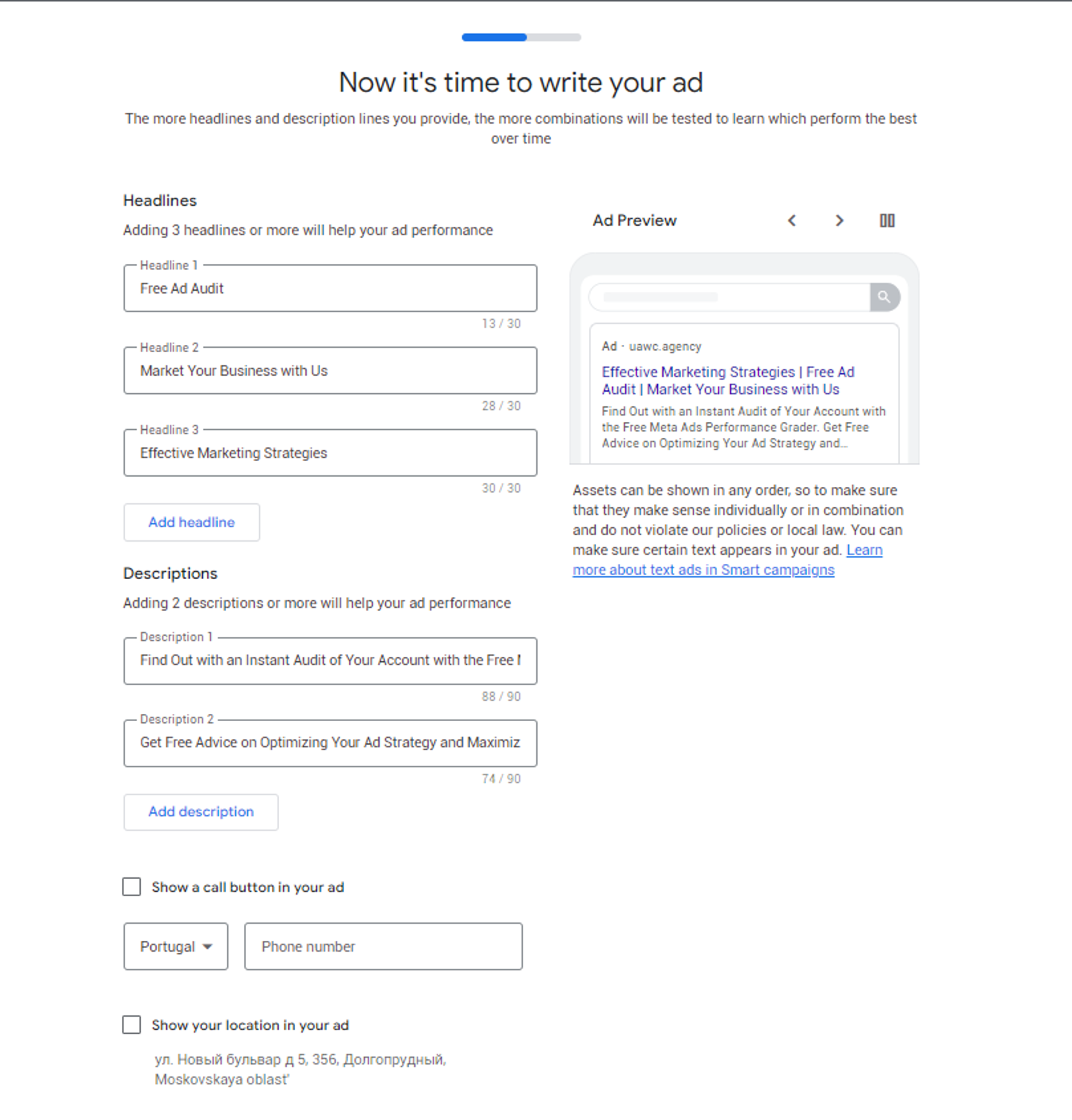
Step 6: Set Up Keyword Themes
Focus on the product category you're selling. These themes will help your ads appear in relevant Google searches.
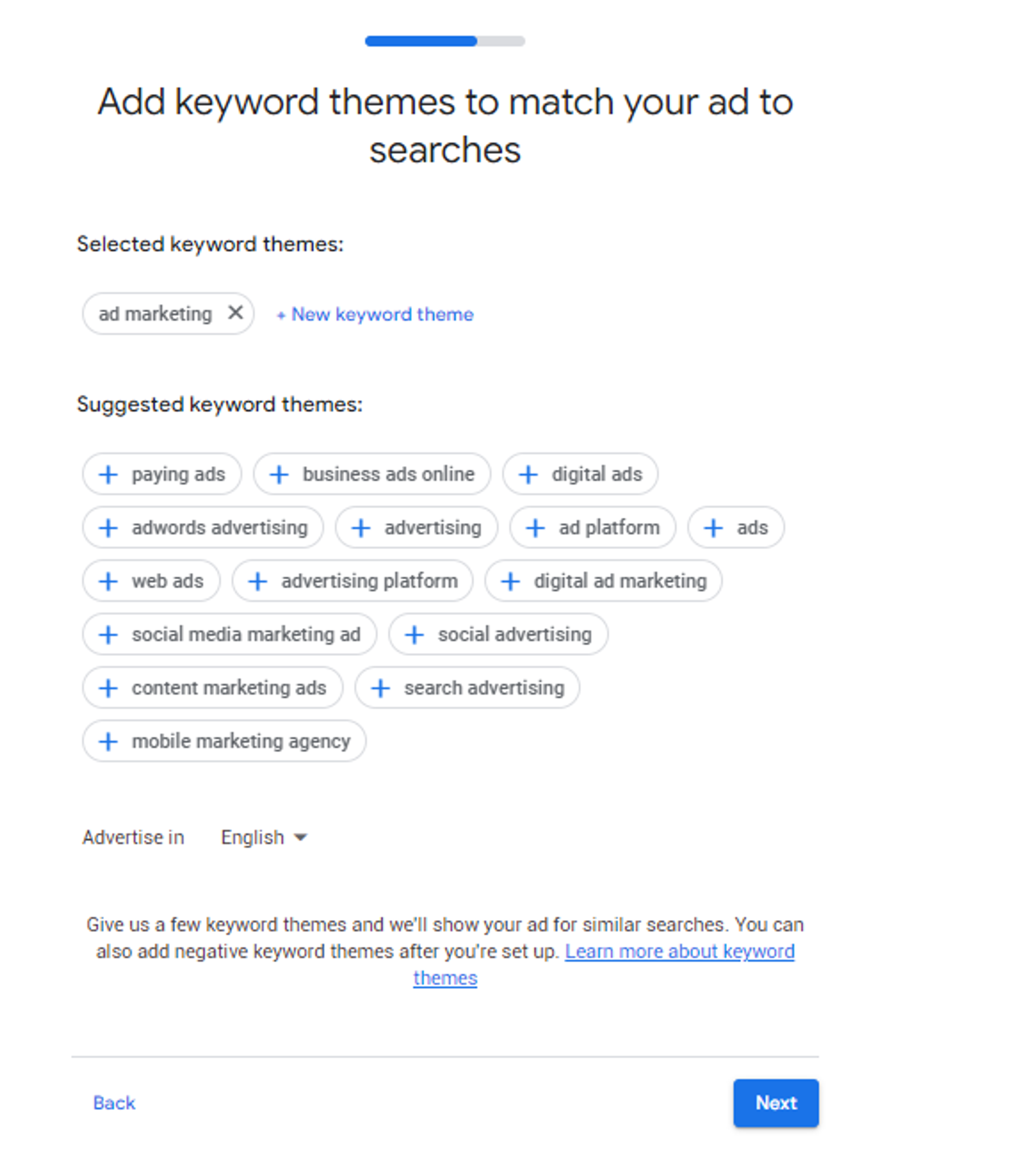
Step 7: Target Your Location
Specify the geographical area you're targeting. You can create a radius around your business or pick specific areas where you want your ads to appear.
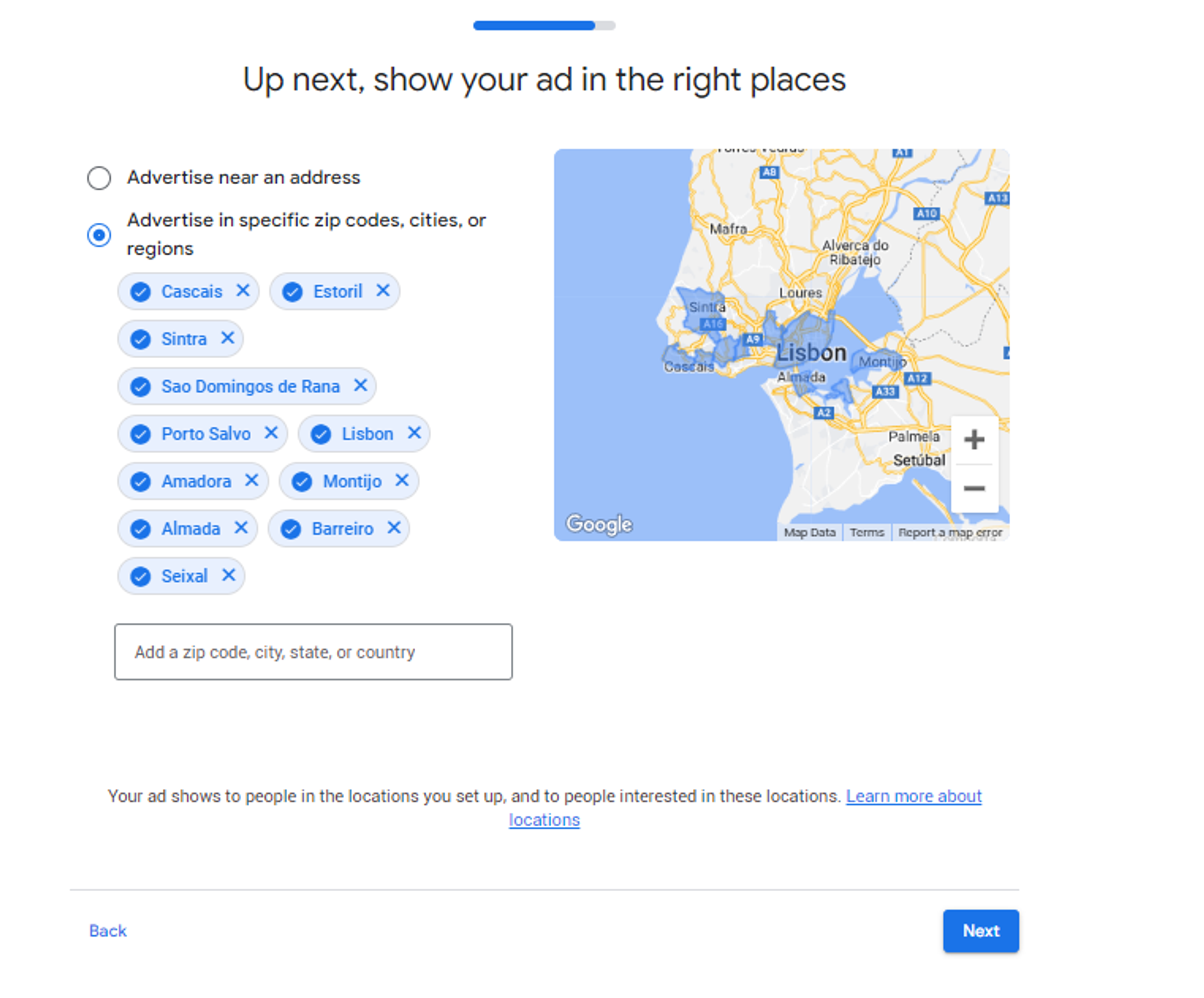
Step 8: Budgeting
Set your budget based on Google's suggestions or your own calculations. You can adjust it later depending on your campaign's performance.
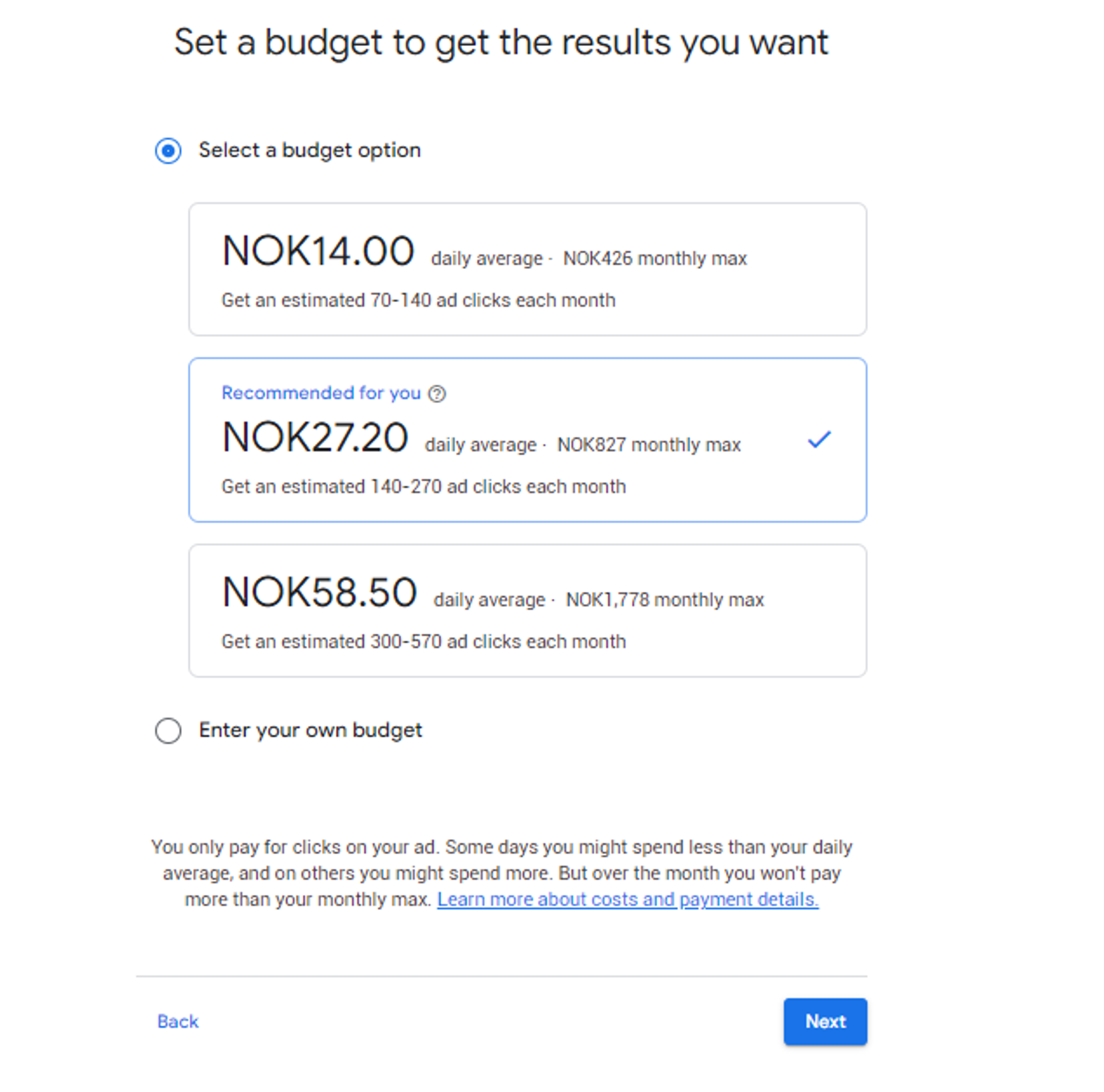
Step 9: Review and Launch
Before launching your campaign review the summary of your campaign settings. This is your last chance to make any adjustments. Double-check all details to ensure they align with your e-commerce goals.
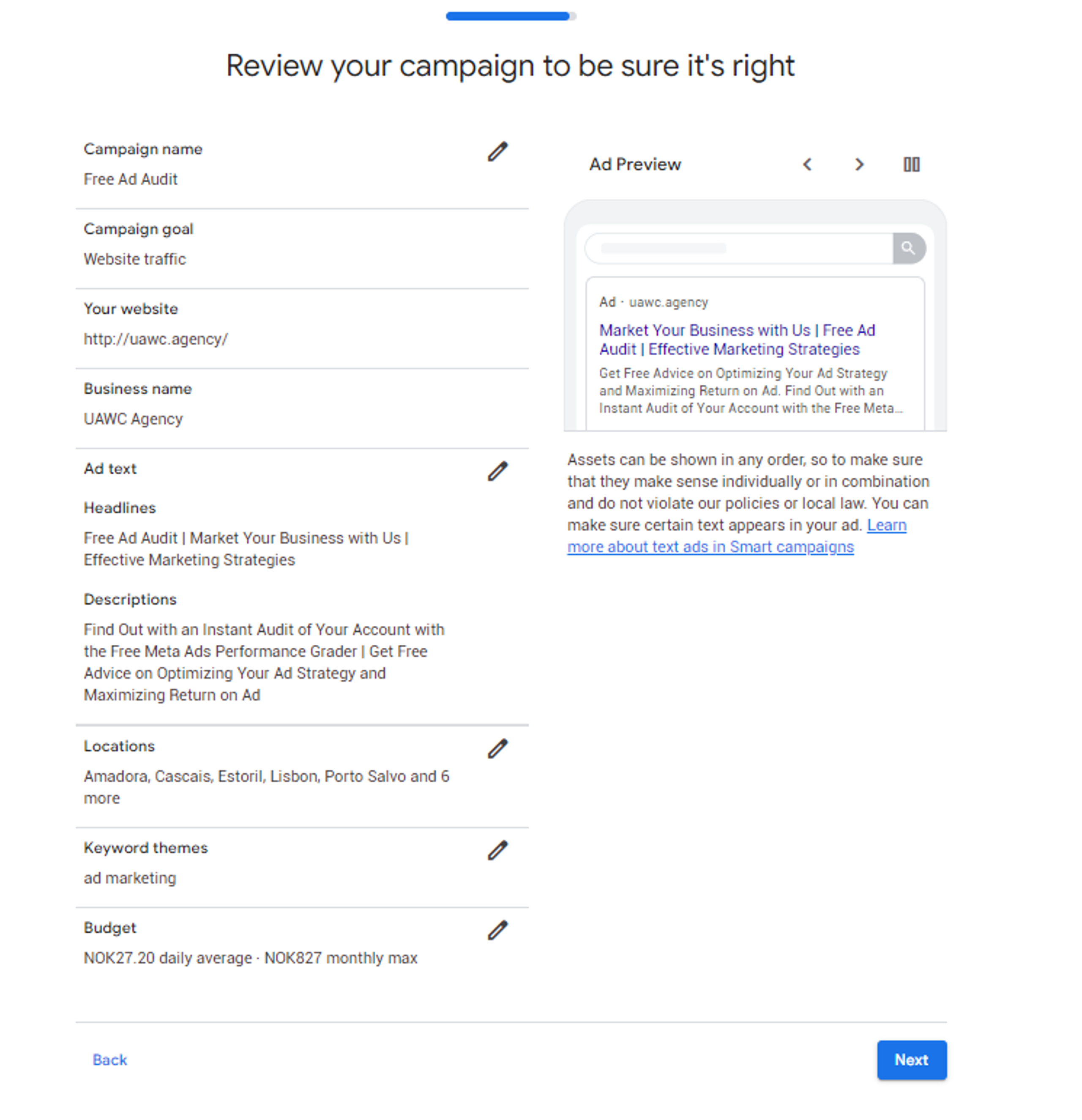
Targeting and Budgeting
Setting Targets
In Smart Campaigns targeting is mostly automated, but you still have control over some key parameters. You can specify geographical locations, down to the zip code if needed. For e-commerce, consider targeting areas where you've seen strong sales or high engagement.
Demographics and Interests
You can also set demographic targets such as age and gender. Interests are another powerful targeting tool. Categories such as "Online Shoppers" or "Tech Enthusiasts" can be particularly useful for e-commerce.
Allocating Budget
Budget allocation in Smart Campaigns is flexible. You can set a daily or monthly budget. For e-commerce, a daily budget is often more effective, as it allows for quick adjustments based on real-time performance data.
Monitoring and Analytics
In Google Ads Smart Campaigns, several metrics are crucial for gauging performance:
- Click-Through Rate (CTR): Measures the percentage of clicks received per impression. A high CTR often indicates effective ad copy and targeting.
- Conversion Rate: The percentage of completed goals (conversions) against the total number of visitors. For e-commerce, this could mean sales, sign-ups or other actions you deem valuable.
- Cost Per Click (CPC): The average amount you pay for each click. Lower CPC with higher conversion rates is generally desirable.
- Return on Ad Spend (ROAS): Calculates the revenue generated for every dollar spent on advertising. A key metric for evaluating ROI.
Interpreting This Data for Performance Improvement
- CTR and Conversion Rate: A high CTR but low conversion rate may indicate a disconnect between your ad and the landing page. Consider revising the landing page content to better match the ad's promise.
- CPC and Budget: If CPC is high but conversions are low, you might be targeting too broad an audience. Refine your targeting parameters to focus on more likely prospects.
- ROAS Analysis: A low ROAS could mean your ads aren't reaching the right audience or that your offer isn't compelling enough. Experiment with different ad copies and offers to find what boosts ROAS.
Optimizing for Better ROI
- Adjust Budget Periodically: Don't set your budget and leave it at that. Review performance metrics regularly and adjust your budget accordingly.
- Refine Targeting: If you notice that a particular demographic or geographical area is performing well, consider narrowing your targeting to focus more on that segment.
- Analyze Performance Metrics: Use the built-in analytics of Google Ads Smart Campaigns to monitor key performance indicators like click-through rate (CTR) and conversion rate. High CTR but low conversion may indicate that your landing page needs improvement.
- A/B Testing: Consider running A/B tests with different ad copies or targeting parameters. This can provide insights into what resonates most with your audience.
Future Trends
The landscape of digital advertising is constantly evolving, bringing exciting developments which could revolutionize the way we approach online marketing. Google Ads Smart Campaigns are adapting to these new developments on an ongoing basis, so you will remain ahead of the game.
Algorithmic Advancements
As algorithms continue to become more sophisticated they open up new possibilities for highly targeted and effective advertising. Google is consistently investing in machine learning to enhance Smart Campaigns, and this could lead to even more precise targeting and budget allocation in the future.
Automation and Streamlining
Greater use of automation is expected to streamline advertising processes further. It could generate more efficient Smart Campaign setup, management and optimization, saving marketers valuable time and resources.
Hyper-Personalization
Smart Campaigns are developing greater degrees of hyper-personalization. This process goes beyond simply addressing users by name and involves tailoring every aspect of the ad to align with an individual's preferences and behaviors. By creating highly relevant and personalized Smart Campaign experiences, businesses can foster stronger connections with their target audience.
Predictive Analytics
Smart Campaigns are likely to begin leveraging predictive analytics more extensively over time. By analyzing past data and using advanced computational methods, these campaigns can anticipate which users are most likely to make a purchase. This information can be used to display ads at the most opportune moments, increasing the chances of conversion.
Voice Search Optimization
As voice-activated devices become more prevalent, optimizing for voice search will be crucial. Future updates to Smart Campaigns are likely to include features specifically designed to cater to this trend, ensuring that your ads are easily discoverable through voice queries.
Integration with Other Google Services
Google is working on improving the integration between Smart Campaigns and other Google services like Google Analytics and Google My Business. This will provide a more unified advertising experience, enabling businesses to obtain deeper insights and make more informed decisions.
E-commerce Specific Features
Given the rapid growth of online shopping, Google is introducing more features tailored specifically for e-commerce businesses. These will include advanced tracking options, shopping feed integrations or tools to help businesses better showcase their products and drive sales. Smart Campaigns will utilize all these developments within one platform.
Conclusion
Smart Campaigns offer effective ways to increase your e-commerce revenue. For e-commerce owners, mastering this platform can significantly impact their bottom line. It's about making each advertising dollar work harder for you.
FAQ
1. What are Google Ads Smart Campaigns?
Smart Campaigns are an automated advertising option within the larger Google Ads ecosystem. They use machine learning algorithms to automate tasks like targeting and bidding, making it easier for businesses to run effective ad campaigns without needing to be experts in digital advertising.
2. How can Smart Campaigns benefit my e-commerce business?
Smart Campaigns are designed to optimize your advertising efforts. They automate the targeting and bidding process, helping you reach customers who are more likely to convert. This can lead to increased traffic, higher conversion rates and ultimately more revenue for your e-commerce business.
3. What metrics should I focus on?
For a comprehensive view of your campaign's performance, focus on Click-Through Rate (CTR), Conversion Rate, and Return on Ad Spend (ROAS). CTR gives you an idea of how compelling your ads are, Conversion Rate shows the percentage of clicks which result in a desired action and ROAS helps you understand the profitability of your ad spend.
4. Are there common mistakes I should avoid?
Common pitfalls include setting your targeting too broadly, which can waste your ad spend, and neglecting to monitor key performance metrics, which can result in missed opportunities for optimization. It's crucial to regularly review and adjust your campaign settings to ensure you're reaching your desired audience effectively.
5. What future trends in Smart Campaigns should I be aware of?
Keep an eye out for advancements in machine learning algorithms which will make targeting even more precise. Additionally, Google is working on better integration between Smart Campaigns and other Google services, which could offer a more unified and effective advertising experience.
6. Is advertising with Google a good idea?
Absolutely! Smart Campaigns, in particular, can be highly beneficial for businesses. These campaigns work tirelessly to deliver results, much like having a dedicated marketing team.
With Google's automatic optimizations, extensive reach across various platforms, and precise targeting capabilities, your investment in Smart Campaigns can yield significant returns. A Google Ads account is a wise choice for businesses seeking to enhance their online presence and convert clicks into customers.
